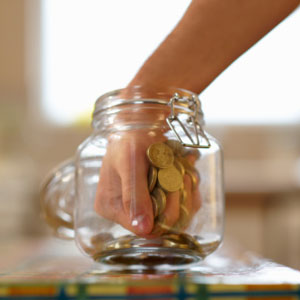
The standard definition is an economy that shrinks for two consecutive quarters (two three-month periods).
Growth in an economy is measured by the gross domestic product (GDP). The GDP is the value of all the goods and services produced in a country in a year.
When less is produced, the economy is said to be shrinking.
Many economists do not support the standard definition of a recession.
For a start, a seriously troubled economy can avoid falling into a recession by slumping one quarter and growing marginally the next, just to slump again.
The US, for one, doesn’t use the definition. There, a nongovernmental research group, the National Bureau of Economic Research (NBER), decides when a recession has taken hold. The NBER looks at a wide range of economic indicators.
The NBER defines a recession as "a significant decline in economic activity spread across the economy, lasting more than a few months, normally visible in real GDP, real income, employment, industrial production and wholesale-retail sales".
The US, the largest economy in the world, has been in an official recession (declared by the NBER) since December 2007. The UK, Germany, Japan, New Zealand and many other countries are currently in recession.
According to the International Monetary Fund, a global recession occurs when the international economy grows by less than 3% a year. There have been three global recessions in the last 25 years.
Is South Africa in a recession?
We’ll know by May 26th.
The economy shrank by 1.8% in the last quarter of 2008 and the GDP data for the first quarter this year will be released next month. If the economy continued to shrink, we’re in a standard-definition recession (two successive “shrinking” quarters).
While some senior government figures, including Finance Minister Trevor Manuel, apparently believe we might avoid a recession, the signs do not look good.
The manufacturing sector is slumping – it shrank 22% in the last quarter of 2008, and continued to contract by 11% in the year to January. Many of the countries who import South African goods – especially our commodities and cars – have huge economic problems and are not placing orders. This is hurting our economy.
Reserve Bank governor Tito Mboweni believes the economy is already in recession.
How will the recession affect you?
If you have a relatively “safe” job – employed as a teacher or civil servant, for example, aren’t struggling to repay debts and won’t be forced to sell your house soon, you could benefit from the recession. The authorities are slashing interest rates to counter the economic cooldown, food and other prices are being lowered and fuel prices have come down a lot as the oil price slumps amid cooler global demand.
But for most South Africans, the recession is bad, bad news. Government estimates that another 300 000 South Africans will lose their jobs before the end of the year, many in manufacturing and mining. With every one job supporting at least eight other South Africans, it will devastate the lives of many people.
What about the D-word?
What is a depression?
They say that when your neighbour loses her job, it’s a recession. When you lose yours, it’s a depression.
There are a number of more formal definitions for a depression. Some economists think a depression is when an economy shrinks by 10% to 20% or when a recession drags on for more than three years.
The last depression, that affected most countries in the world, was felt in the 1930s.
The other R-word: recovery
According to most economists, the US economy will start recovering next year, helping the rest of the world to pick up speed. The US recession is expected to end in the second half of the year.
However, a speedy recovery is not guaranteed. Japan, for example, has been in a recession for nineteen years.
There are still a number of uncertainties in the US – including the state of the housing market and huge problems in the banking sector.
South Africa is in a better position than most. Its banks are not in trouble, government is spending almost R800bn to upgrade SA’s road, rail and port systems and build new power stations and, unlike many other “richer” countries, government finances are not overstretched. Also, the 2010 World Cup should provide a boost.
Still, it may be best to prepare your finances for the worst – live within your means, build up your skills and show your dedication to make your job a “safe” job and paying off your debts.
Has the global economic crisis affected you in any way? Tell us how in the box below.




 Publications
Publications
 Partners
Partners









